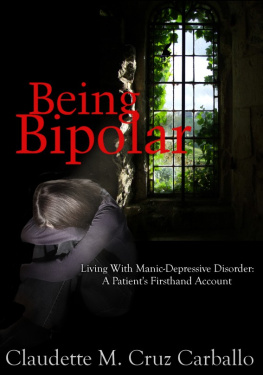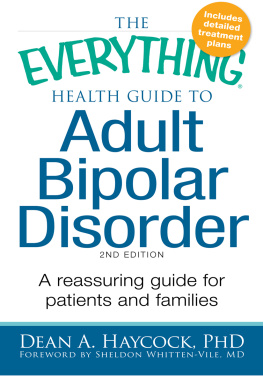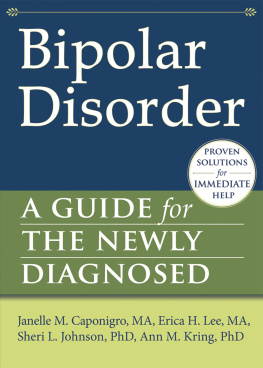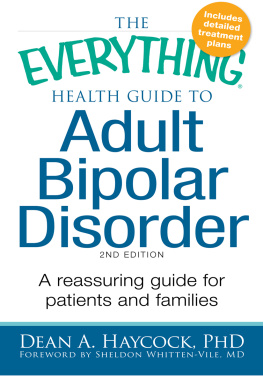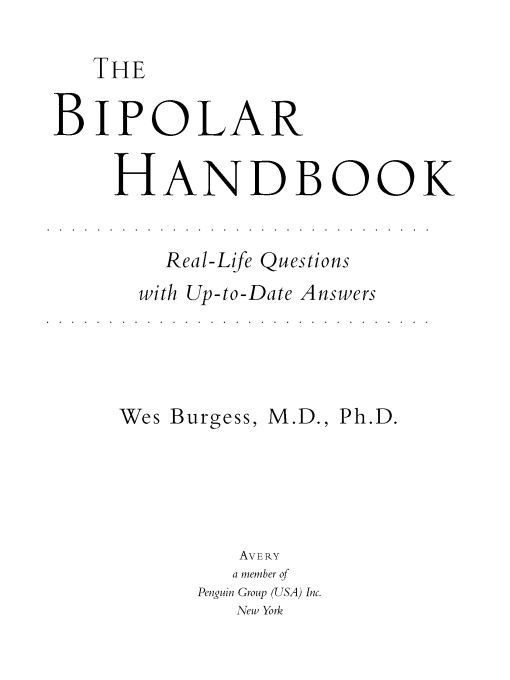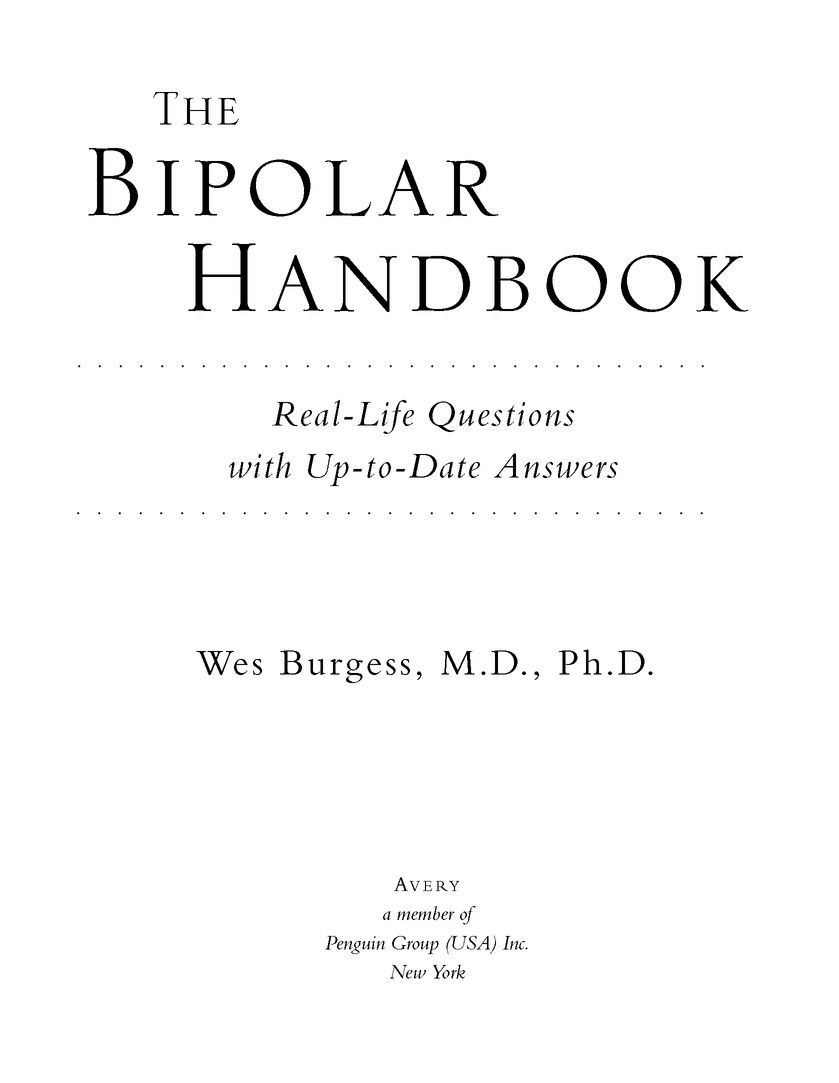Table of Contents
Manic depressions touching my soul.
I know what I want, but I just dont know how to go about getting it.
Jimi Hendrix
Introduction
Yesterday, a woman named Susan found out she had bipolar disorder. She, her family, and her friends rushed to the bookstores and the Internet to find answers to their many important questions about bipolar illness. Unfortunately, what they found told them more about problems than solutions.
My patients asked me to write The Bipolar Handbook so they could see the answers to their questions in a book that they could take home to read and share with their families and friends. Boyfriends, girlfriends, and spouses asked me for a book they could give to their partners to help them understand what it is like to be bipolar. Doctors, nurses, and therapists asked me to write a book that they could give to their bipolar patients and families to help answer their questions.
Bipolar disorder is a unique medical disease that affects career, school, relationships, thoughts, emotions, energy, sleep, weight, and physical health. It is particularly known for episodes of either hyperactive mania or unmotivated depression, but many people have mixtures of these symptoms.
Individuals who suffer from bipolar disorder need two things: an understanding of their illness and practical strategies to get along in the world. Ever since I started my psychiatric practice, almost twenty years ago, I have been writing down all the questions asked by my bipolar patients, their families, and their friends. I asked other professionals what questions they were asked, and I scoured the Internet to find questions that had not been satisfactorily answered by patients doctors and therapists. The Bipolar Handbook is a compilation of those real-life questions with up-to-date answers gathered from modern medical and psychological knowledge and from my personal medical experience. No doubt, you will find answers to your questions here.
There are more than seven million adults and children with bipolar disorder in the United States. Politicians, celebrities, and members of your community are coming out and revealing that they have bipolar disorder. Many best-selling books are about bipolar illness. The news and the Internet are buzzing about bipolar disorder. Each year, I am asked to share my knowledge as a psychiatry expert on National Public Radio, on television, and in feature films. Old treatments are being validated and a range of new medication and nonmedication treatments for bipolar disorder is just becoming available. Both doctors and the general public are beginning to understand bipolar disease, and the long-lived stigma against bipolar disorder is abating. Now the world knows that many normal, successful, and famous individuals are bipolar and that they have found good treatments for their disorder.
I began my professional life as a scientist, studying the brain and behavior in departments of medicine and psychology at major universities. One day I felt a calling to change to clinical work so I could spend the rest of my life helping people with bipolar disorder and other illnesses. I completed my specialty training at Stanford University Medical School and served as a fellow at Stanford University and UCLA medical schools. Since then, as a licensed medical doctor and practicing psychiatrist, I have spent each day helping people with bipolar disorder and their families find the best ways to succeed in work, relationships, and family life. For the sake of my patients, I have to know what works and what doesnt work.
I wrote The Bipolar Handbook to be like a friendly chat with a trusted family physician who knows how to address your own personal worries and fears and who solves problems like yours on a regular basis. I want it to be as if you and I were sitting down and talking face-to-face so that I could give you individual counsel and cutting-edge information on the topics that you chose. I want the book to contain detailed information that has not yet reached textbooks, reference books, or the press, and yet still be easy to read and understand.
I want The Bipolar Handbook to give you options and choices beyond the same old theme of just stay on your old medications. Most of all, I really want to stimulate your desire to know and find out everything there is about bipolar disorder.
My ultimate goal is to help people with bipolar disorder achieve their goals and access their special potential so they can live happy, fulfilling lives. It will take work, but the results are worth it. Lets not waste any more time.
BIPOLAR DISORDER BASICS
We all have to become experts on bipolar disorder, if only because the general public knows so little about the illness. This chapter will help you understand the definition and symptoms of bipolar mania and depression, the different types of bipolar disorder, the causes of bipolar disorder, and the way society responds to people with the illness.
What is bipolar disorder?
Bipolar disorder is a disease of the nervous system that involves the brain and the body. Environmental, hereditary, genetic, and biological factors create changes in brain cells and an imbalance in the chemicals within the nervous system, resulting in abnormal fluctuations in metabolism, emotions, and thought processes, including attention.
What does the name bipolar disorder mean?
Bipolar refers to the two physiological states of mania and depression that are associated with the illness. These gave rise to the previous name of manic depression. Although many people with this disorder have mainly manic or mainly depressive episodes, there is usually a mixture of symptoms at any given time.
Bipolar disorder causes much more than simply mania and depression. It can also cause feelings of irritability, anger, jealousy, resentment, anxiety, avoidance, embarrassment, fear, inadequacy, regret, and confusion. In addition to mood swings, you may experience drastic fluctuations in energy, activity, weight, metabolism, and the sleep/wake cycle. Bipolar disorder increases your sensitivity to stress so that you become more vulnerable to life changes.
Bipolar disorder impairs thinking by causing poor focus, distractibility, and poor memory. Poor judgment, impulsivity, repetitive, obsessive thoughts, and overfocused, compulsive activities make you more likely to overwork, overindulge, and take unnecessary risks. Problems with procrastination, poor motivation, and difficulty starting and/or finishing projects make it difficult to attain your life goals.
How many people have bipolar disorder?
It is estimated that 2 to 7 percent of people in the United States suffer from bipolar disorder. Almost ten million people will develop the illness sometime during their lives. About half of those will never receive the correct diagnosis or treatment.
How many people are affected by bipolar disorder?
In addition to the people directly suffering from the illness, bipolar disorder affects the lives of their parents, brothers, sisters, spouses, children, grandchildren, and friends. Parents struggle with the problems of bipolar disorder in their children. Doctors, nurses, therapists, and social workers devote their time to helping and caring for individuals with bipolar disorder. All in all, I estimate that about twenty million peoples lives are touched and changed by bipolar disorder in the United States alone.


